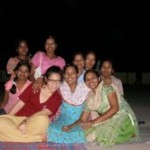The Delhi Commonwealth Games: The Good and the Bad
-Pragya Krishna, BMC ’13
With over Rs. 70,000 crore rupees being spent on the two week event, calling the Commonwealth Games* in Delhi a big deal would be a massive understatement. The Games begin October 3rd, and as someone with 50% of her friend circle and family there, I can completely testify to the fact that it is ALL that is on anyone’s minds in that city these days.
Schools and institutions are going on holiday, college students are finding internship, managerial, leadership and resume opportunities galore, and newspapers are having field days. It is the first and last topic of debate and discussion, particularly in government offices – I can testify to that too, having interned in one over the summer.
Given all this drama, you would think that when the time rolled around, the Games would be a big success, like the Beijing Olympics, right?
Wrong. While they show promising signs of being a kind of success, there are unfortunately, many issued that are turning the Commonwealth Games into a kind of debacle for the Delhi government.
For starters, just a few months before the games, a massive corruption scandal was exposed, involving millions of rupees transferred by a committee of the government to a company in the U.K. that had no record of any transactions with said committee whatsoever. The money had been pocketed.
Then, two foreign visitors were shot by suspected militants on September the 19th, and that combined with, as Reuters put it recently “a dengue fever epidemic, heavy monsoon rains, delayed construction, graft scandals and traffic chaos” led to quite a few athletes and teams beginning to pull out of the games, saying they were worried about their safety. Thankfully the number wasn’t that large, but the fact that it occurred at all was embarrassing nonetheless. Further, pictures of children employed in the construction activities for the games began to emerge, enraging the international community who could not understand that laborers bring their children to help in the work on a regular basis. Athletes began arriving to Delhi weeks ago. Accommodations were largely up-to-par, but a few notable exceptions stood out, with four or five accommodation towers lacking fitted toilets and plumbing.
To top all of this off, the real, legitimate question that is being posed by many is: Why did Delhi try to take on such an undertaking in the first place? Sure, it is a matter of pride, but couldn’t the money have been better used for the pro-poor policy the government continues to extol? Sure, the games may have created jobs, but couldn’t those have been created more efficiently by an indigenous project? What if some members meant to siphon money away all along?
In any case, the games are happening, and aside from the embarrassing issues mentioned above, the entire city is taken with them. Many internationals are expressing their admiration over the accommodations and the beauty of the city. There is no doubt that for every one person exploiting or disrespecting the games, there are three more who are working for it with genuine pride and nobility, from top government figures to college freshmen. India has a history of deep hospitality, and that will no doubt show itself again this time around. A more positive picture is bound to emerge at the end of the games, but the many issues that came to light during preparation need to be addressed. It is clear that they underscore the same note that has been playing for the past few decades: India has come a long way, but it still has a long way to go, and furthering this, should be more careful about how it gets there.
* The Commonwealth is an international association consisting of the UK together with states that were previously part of the British Empire, and dependencies.
~ * ~
Experiencing the Beauty of India
-Yong Jung Cho, BMC ’12
With one backpack and a medium sized suitcase, I landed in Calcutta at 11pm, June 7th. I stepped off the plane and was welcomed to India with an incredible wall of heat which caused my glasses to immediately fog and my clothes to stick right against my skin. Calcutta’s heat was brutal; the heat from the sun, the people, the animals and automobiles. However, it was not the sweat, the crowds, the noise, the crows, the untrustworthy tap water that bothered me the most; it was the unexpected level of poverty.
I was shocked: in one of India’s largest cities, poverty and unemployment had such an overt presence. Families built homes out of debris, children were begging on the streets and people were bathing from gathering water from the public water pumps.
I saw similar levels of poverty in Koderma, a small district in the Jharkand state, the location of my 10 week-long internship where I worked as a hospital staff member and a school teacher. It was in this setting, where I suddenly realized how important rain was. The monsoon season was late and so farmers were desperate; I had forgotten that people still depend on nature for survival. I met villagers who were restricted to having one bucket of water for an entire day. Things that I had consumed without a thought in the United States held such great significance in my new surroundings.
However, despite all the sadness I witnessed, I also experienced so many beautiful things. Over my two month stay, I grew to love the community I served. I met and developed friendships with people who were warm, hospitable, funny, intelligent, and strong; simply amazing people. I will never be able to forget the moments of laughter, songs, dance, conversations and smiles.
Much of the Indian population live in absolute economic destitution, but I have much hope for the nation because there is just so much wealth within the peoples’ hearts.
Hanging out with friends on a rooftop